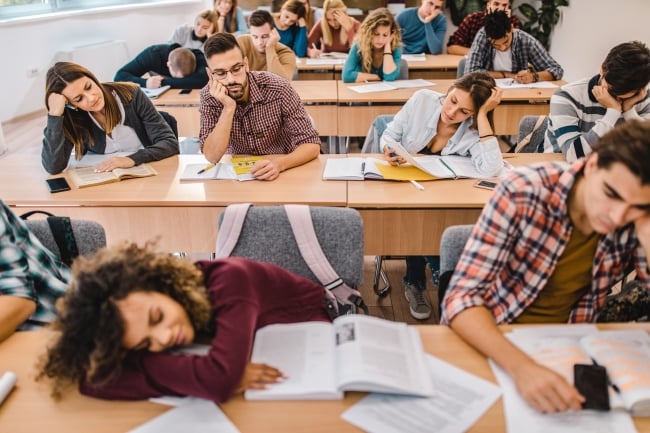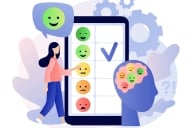You have /5 articles left.
Sign up for a free account or log in.

College students are prone to skipping sleep. To encourage better sleep habits, first-year seminar instructors at NYFA added an assignment to the course.
skynesher/E+/Getty Images
New York City is the city that never sleeps, and that can be true for its college students as well. A recent student survey at the New York Film Academy found that, even among nationally poor sleeping habits for learners, NYFA students slept less than their peers.
One in eight NYFA students said they slept for four or fewer hours at night, compared to 4.5 percent of college students nationally, and only 17 percent of NYFA students said they slept at least seven hours at night, compared to 59 percent of their peers.
In response, first-year seminar instructors now teach about the importance of sleep and design assignments focused on helping learners understand their sleep habits and why it matters.
The background: The first-year seminar within the bachelor of fine arts program at NYFA is constantly evolving based on students’ needs, says Lauren Brickman, a freshman seminar instructor at NYFA.
“A really well-executed first-year seminar course is about orienting students not only to the specific campus that they’ve chosen, but just what it means to be a student at this particular moment in time that they are starting that journey,” Brickman says.
Health and wellness has always been a part of the course, but sleep was a more recently added topic based on the wellness survey.
Among artists, there’s a drive to always be doing more, Brickman shares.
“There’s so much pressure, particularly in New York, where there’s so much opportunity,” Brickman says. “I know a lot of students struggled saying no to things, particularly hungry filmmaking students who are like, ‘I want as much experience as I can.’ And then it’s to their own detriment, though.”
The same survey found 38.9 percent of students ranked their stress levels as high in the past 30 days, with an additional 47 percent facing moderate stress in the past month.
Survey Says
A December 2023 poll from Gallup found 57 percent of U.S. adults say they would feel better if they got more sleep. Young women (ages 18 to 29) were least likely among all age-by-gender groups to get enough sleep (27 percent), while nearly half of young men (46 percent) said they got adequate sleep.
Poor sleep can impact college students’ attention in class, but also their mental health and wellness. A 2018 study found when sleep hygiene is neglected, students are unable to use proper coping mechanisms, which can be associated with depression or depressive symptoms in some cases.
Recent research has also found students who don’t sleep as well are more likely to use self-defeating humor and profanity, which isn’t directly related to student success but an interesting fact.
How it works: Each first-year seminar instructor is given the academic creativity to decide how they want to structure their course, so how each cohort is taught about sleep varies, but each receives a visit from counseling center staff to lead a class and talk about the issue.
The counseling center frames the issue with science and research and also creates a student-centered conversation about how they can receive help on campus.
Another assignment across courses is a sleep log, in which students track how many hours they’re devoting to sleep, helping them both understand their current behaviors and identify ways to improve.
This teaches students that “nothing happens in a vacuum,” and how they prioritize their time and energy is reflected in their health and wellness, Brickman says. “Really trying to get them to interrogate, what are your habits? What are your practices that might be contributing to or exacerbating these different challenges? Yes, there are never enough hours in the day … but are there things that you might be doing that are making that even harder?”
One assignment Brickman created that helps students in their wellness is a directive to participate in two free or low-cost outdoor activities. Brickman will cancel an in-person class session—instead offering an asynchronous class for students to complete—and during that time students are instructed to unplug and get outside in some way. This could be visiting a park, exercising outdoors or walking through a sculpture garden.
After completing both activities, students submit a reflection comparing and contrasting how the experience made them feel. Brickman has seen “really amazing responses” to the assignment both in creative works but also how students are encouraged to unplug, get off their computer and do something else. It’s also benefited students’ sleep and their technology habits.
Phones and Sleep
A February survey found U.S. adults spend around 3.5 hours on social media before bed each day and that 74.7 percent of social media use happens before bed.
The impact: Talking about sleep also opens up conversations about time management and the value of self-care as a life skill.
“The thing I like to tell my students is the biggest lie ever told myself was [life] gets easier after graduation,” Brickman says. “It just gets different. You just have different balls that you’re juggling.”
More recently, Brickman has started teaching a psychology of performance class for upper-level students in which she revisits many of the themes from the first-year seminar, including self-care, to check in with students.
For others looking to model the initiative, Brickman encourages professors to remember that while encouraging college students to get more sleep may be an age-old focus in higher education, every cohort of students needs to hear that message and be encouraged to develop healthy habits.
Do you have a wellness tip that might help others encourage student success? Tell us about it.








